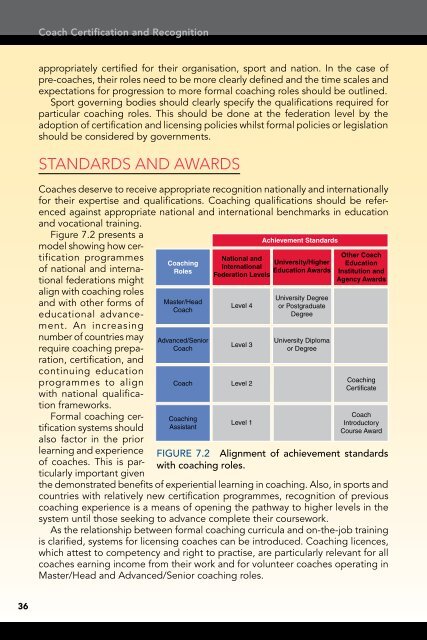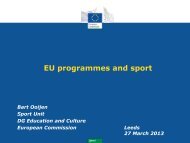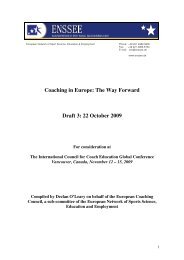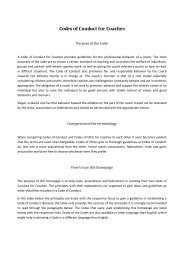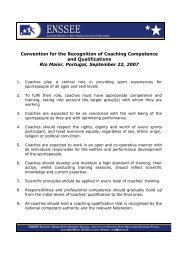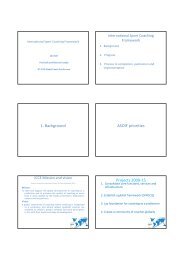International Sport Coaching Framework â version 1.1
International Sport Coaching Framework â version 1.1
International Sport Coaching Framework â version 1.1
You also want an ePaper? Increase the reach of your titles
YUMPU automatically turns print PDFs into web optimized ePapers that Google loves.
Coach Certification and Recognition<br />
appropriately certified for their organisation, sport and nation. In the case of<br />
pre-coaches, their roles need to be more clearly defined and the time scales and<br />
expectations for progression to more formal coaching roles should be outlined.<br />
<strong>Sport</strong> governing bodies should clearly specify the qualifications required for<br />
particular coaching roles. This should be done at the federation level by the<br />
adoption of certification and licensing policies whilst formal policies or legislation<br />
should be considered by governments.<br />
STANDARDS AND AWARDS<br />
Coaches deserve to receive appropriate recognition nationally and internationally<br />
for their expertise and qualifications. <strong>Coaching</strong> qualifications should be referenced<br />
against appropriate national and international benchmarks in education<br />
and vocational training.<br />
Figure 7.2 presents a<br />
Achievement Standards<br />
model showing how certification<br />
programmes<br />
Other Coach<br />
National and<br />
<strong>Coaching</strong><br />
University/Higher Education<br />
of national and international<br />
federations might<br />
Agency Awards<br />
<strong>International</strong><br />
Roles<br />
Education Awards Institution and<br />
Federation Levels<br />
align with coaching roles<br />
University Degree<br />
and with other forms of Master/Head<br />
Level 4 or Postgraduate<br />
Coach<br />
educational advancement.<br />
An increasing<br />
Degree<br />
number of countries may Advanced/Senior<br />
University Diploma<br />
Level 3<br />
require coaching preparation,<br />
certification, and<br />
Coach<br />
or Degree<br />
continuing education<br />
programmes to align<br />
<strong>Coaching</strong><br />
Coach Level 2<br />
Certificate<br />
with national qualification<br />
frameworks.<br />
Formal coaching certification<br />
systems should Assistant<br />
Coach<br />
<strong>Coaching</strong><br />
Level 1<br />
Introductory<br />
Course Award<br />
also factor in the prior<br />
learning and experience FIGURE 7.2 Alignment of achievement standards<br />
of coaches. This is particularly<br />
important given<br />
with coaching roles.<br />
the demonstrated benefits of experiential learning in coaching. Also, in sports and<br />
Figure 7.2<br />
countries with relatively new certification programmes, recognition of previous<br />
coaching experience is a means of opening the pathway to higher levels in the<br />
system until those seeking to advance complete their coursework.<br />
As the relationship between formal coaching curricula and on-the-job training<br />
is clarified, systems for licensing coaches can be introduced. <strong>Coaching</strong> licences,<br />
which attest to competency and right to practise, are particularly relevant for all<br />
coaches earning income from their work and for volunteer coaches operating in<br />
Master/Head and Advanced/Senior coaching roles.<br />
36


